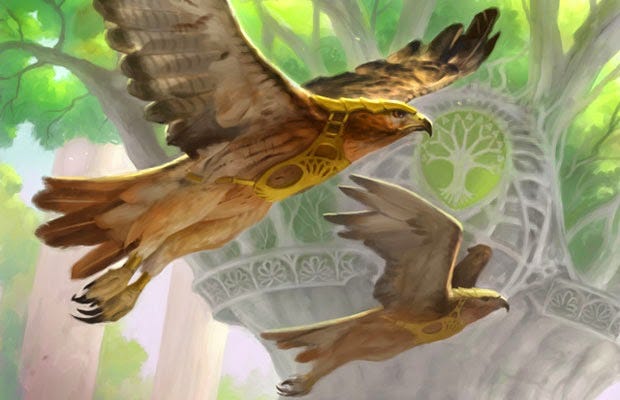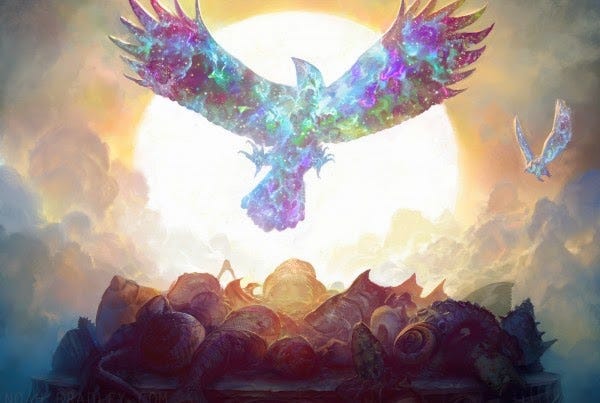Malbim: On Hashgachas Hashem and Human Responsibility (2 of 2)
If you haven't read Malbim: On Hashgachas Hashem and Human Responsibility (Part 1), you are advised to do so before proceeding. It would also be prudent to review the pesukim on which the Malbim will be commenting, as well as the disclaimer, which applies here as well.

Artwork: Eyes in the Skies, by James Rhyman
Having established a framework for understanding reward and punishment and their relationship to individual and societal suffering, the Malbim goes on to explain how this principle sheds light* on the question of "rasha v'tov lo" (i.e. a wicked person who prospers). The Malbim writes:
On the basis of this argument, the question that Iyov asked in chapter 24 is completely upended. [Iyov asked:] “Aren’t there are wicked men who destroy civil society, such as pirates on the seas and robbers in deserts who kill wantonly and destroy the world? Why doesn’t God destroy them and remove their evil from the world?” The answer to this question is now clear:
(9) “People will unite in the face of oppression.” Isn't it clear that Hashem arranged for the correction of this problem within the nature of man himself? Hashem providentially supplied all living creatures with the tools and faculties necessary to protect themselves from their enemies, in order to maintain their species and individuals. This providence certainly extended to man, the choicest of creations. [Hashem did this] by creating man to be a social animal. He implanted in man's nature the ability to form societies, to institute righteous laws and rules, and to enforce lawfulness and justice all who violate the statutes and rules [of the society], thereby eradicating all evildoers from the land.
Thus, if the majority of people are good and love justice and righteousness, it will be impossible for robbers and murderers to multiply and destroy civil society. The good people of the nation, who constitute the majority, would immediately rise up to destroy these predators and banish them from the earth. It would not be necessary for God Himself to descend from on high to do battle with these destroyers, since – in bringing them to justice – all righteous human beings are the agents by which He enacts justice. The people of society will gather together as one, with their judges at their head, to destroy and banish the evildoers.
This is the meaning of the statement: “People will unite in the face of oppression.” Isn't it clear that Hashem implanted within man’s nature the ability to unite as a society and “cry out to be rescued from the oppressors’ strong hand”? The people of the land, who will outnumber those who oppress and murder, can assemble and cry out for deliverance from these oppressors, who will be the minority among the population at large, and destroy them.
It is in this sense that Hashem providentially arranged for man to protect himself against oppressors and predators by enabling society at large to annihilate these destroyers.

Artwork: Fable of Wolf and Owl, by Heather Hudson.
According to the Malbim, the next few pesukim show that although this hashgachah extends to all species, though it is specialized in the case of man.
(10) [God actually grants these protective measures to all His creatures.] Even to the bird, “He grants nightly song.” These are weak birds whose nature, as implanted by Hashem, is to sing at night. Because of their fear of nocturnal predators, they sing at night to alert each other to gather together and fight for their lives if a predator comes among them. They sing in order to warn one another about the threats that the night brings. In this way, they can protect themselves and preserve their species, such that “No [bird] inquires, 'Where is God, my Maker?'” In other words, [it would be false to say that such a bird] isn't under the providence of Hashem, its maker, since as He created it weak and vulnerable to be preyed upon by the stronger predators. In truth, Hashem’s providence did extend to this bird, insofar as He created it in a manner whereby it can be protected from those who seek to harm it. And if Hashem, in His providence, arranged such protection in the nature of lowly creatures – by granting them the ability to call out and be saved from oppression by taking a stand against their oppressors, and to do battle with the predatory animals – then He certainly providentially arranged [protection] for man in this manner.
(11) Therefore, “Let us learn from the beasts of the field.” Since God conferred on mankind greater wisdom than that which was given to beasts and birds, how can man say, “Where is God, my Maker? God does not watch over me and protect me from predators and oppressors”? On the contrary, Hashem has most certainly extended His Divine Providence to the human species in an even more elevated fashion. Human beings can increase their wisdom by studying the nature of all living things, integrating the lessons learned from all of them into their own intelligence. This is what was meant by the statement: “Let us learn from the beasts of the field” – man should learn from their behavior patterns what he must do to preserve his own numbers and protect his own species. Therefore, mankind should gather together and stand united to defend their lives against the robbers and murderers who are out to destroy them. And when a predator comes among them, they, too, should “sing out in the night.”

Artwork: Rise of Eagles, by Noah Bradley
Our excerpt from the Malbim concludes with an answer* to the question, "Why does Hashem allow evildoers to prosper? Why doesn't He destroy them?"
(12) On the basis of this principle, you will find an answer to your question, namely, that “there people will cry out and [God] will not answer them.” Iyov made this statement in chapter 24: “The groans of the people rise up from the city, and the spirits of the slain cry out for deliverance – yet God finds no fault with the wicked!” (Iyov 24:12). Murderous assassins wreak havoc in the city and cause the deaths of so many people – whose spirits then cry out to God, as it says right there, “The spirits of the slain cry out for deliverance” – that they cry out to God for salvation. So why doesn't God answer them and hold guilty those who are responsible?
The answer is: “because the wicked have grown so in strength” – because the wicked have overwhelmed the righteous with their intensity and strength. This is a sign that the majority of society is wicked and doesn't strive to execute judgment and banish those who do evil. Otherwise, the wicked would not have been allowed to become powerful enough to attack the city and kill the people there, and then those who were being oppressed would attempt to escape the strong hand [of the wicked] by crying out for deliverance. The greater majority [of the society] would have gathered together in great numbers to hasten to the rescue of those who were being oppressed and banish the evildoers. Therefore, this matter [of insuring the protection of the weak against the strong] is a responsibility incumbent upon society itself – not upon Hashem.
(13) Consequently, “it is false” and vain for you to interpret these events to mean “that [God] does not hear” the cries of the oppressed “and that the Almighty does not see them” that He doesn't providentially supervise them and that He doesn't see the evil of the oppressors. [Such an interpretation] is false and deceitful, for Hashem hears and sees everything that happens on earth.
(14) “Even though you say that you cannot perceive [Divine Providence]” – even though you say that you cannot perceive or see with your own eyes how Hashem providentially arranges for justice on behalf of the oppressed – the truth is that “there is judgment before Him.” God has indeed established a mechanism for justice to be executed in this world, and “you were created to implement it.” You [mankind] were created to be the agents of Divine Providence and to carry out these judgments when it comes to the robbing of the poor and the murder of the indigent. This means that upon your creation, the potential for eradicating evil from the land and providing justice for the oppressed was implanted in your nature. This enables you to battle and overcome those who breach laws and oppose peace.
In summation: It is our responsibility - not Hashem's - to form righteous societies and to defend the weak against the evildoers who threaten them. Hashem endowed man with the intelligence to understand justice and the innate drive to create societies with laws to enforce it. Moreover, He gave us His Torah, which contains everything we need to accomplish this task. The question we must ask ourselves is: What is stopping us?

* DISCLAIMER: You are about to read an excerpt from the Malbim's commentary on Sefer Iyov about the nature of reward and punishment. Sefer Iyov is 42 chapters long, and this excerpt represents only a fraction of the total picture. Thus, what you are about to read should NOT be taken as the "be-all and end-all" on the topics of reward and punishment, hashgachah pratis, and God's justice. There are many aspects of these topics which the Malbim does not address, and many questions which cannot be answered on the basis of these concepts alone. While it might be tempting to attempt to build an entire worldview based on the ideas set forth here, such an endeavor would be flawed from its inception. Think responsibly.



